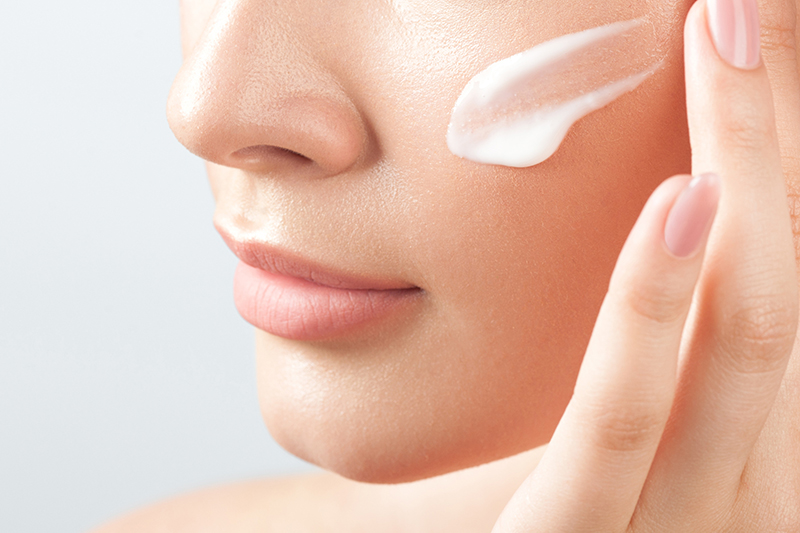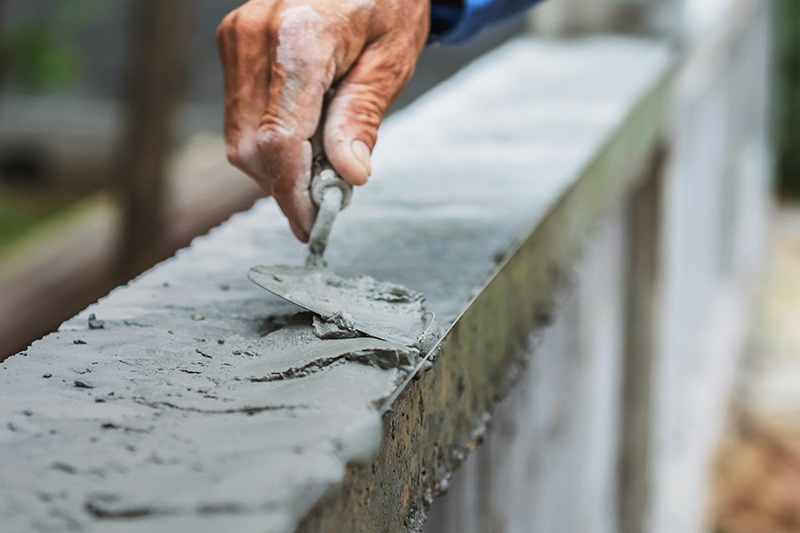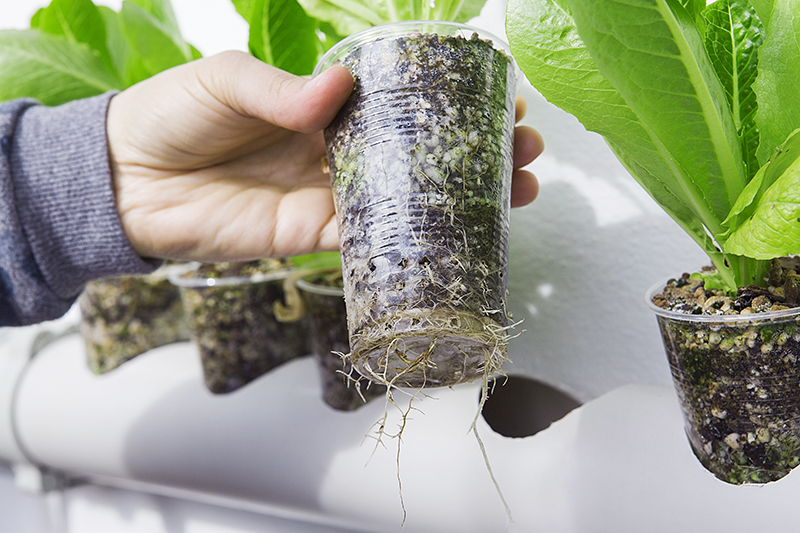The use of perlite

The use of perlite
The basic properties of expanded perlite make it possible to use it in many branches of the economy. In construction, it can be used for screeds, plasters and masonry mortars, for thermal insulation or insulation. In agriculture and horticulture, it is used in mixtures with soil or as an independent hydroponic substrate in plant cultivation. In breeding, e.g. as a carrier of antibiotics. It can also be used as a sorbent for petroleum substances.
Applications – construction
Expanded perlite as a light material with very high thermal insulation and non-flammable properties is used in modern construction. It is used as an insulator in its basic form (as granules) or as a component of heat-insulating masses and mortars.
The basic types of applications of expanded perlite in construction are:
- insulation of concrete floors
- insulation of attics
- backfilling the voids in ceramic blocks
- as an admixture of gypsum plasters
- as an admixture of plasters and cement-lime mortars
- insulation of chimneys by filling the space between the liner and the bricks
- as a component of perlite-concrete, used in prefabricated elements, e.g. chimney and wall blocks and other concrete accessories for the construction industry
Applications – horticulture
Horticultural perlite appears in the form of porous granules of irregular shape, thanks to which it retains water very well. It is characterized by high sterility, it is also chemically inert. The use of perlite is very wide and effective, which is the reason this product is also increasingly popular in horticulture.
The main ways to use perlite in horticulture are:
- as an additive to soil to strengthen the rooting of flower, vegetable or fruit seedlings
- in hydroponic cultivation
- as an additive to potted plants – reduces water evaporation and ensures regular air flow to the root system
- in greenhouse crops as a soil regulator
- in the construction of roof gardens
- as a substrate for mycelium
Perlite in industrial
Expanded perlite, in addition to its popular applications in construction and horticulture, is also widely used in various industries. It is used, among others:
- in industrial furnace burner covers
- in elements of metallurgical furnaces,
- in ceramic refractory products,
- in iron founding,
- as a filler in industrial materials,
- as an absorbent of oils, sludge, sewage,
- as a gap filler in mining,
- as a filtering material in the food industry (including sugar, brewing),
- as a filtering material in rainwater and storm sewage systems,
- in municipal wastewater treatment installations,
- in the pharmacological industry (as a carrier of medicines for animals).
These are just a few of the many industrial applications of expanded perlite. Excellent insulating properties, high fire resistance, porosity, moisture absorption, biological and chemical neutrality as well as low density of this material mean that it can be used in virtually all major industries.
Perlite in breeding
Perlite is a material of natural origin, it is chemically inert and sterile. For this reason, it has found application in breeding, among others, as a carrier of liquid additives, such as vitamins or drugs. Perlite impregnated with the medicine is added to the animal feed. The perlite medicine is gradually released in the animal’s body, the perlite itself remains excreted. Perlite is added to fodder which acts as a natural anti-caking agent. On farms, it has also been used as an odor and moisture absorber in bedding.
Application in breeding:
- medicine and vitamine carrier
- anti-caking agent for fodder
- odor absorber
- moisture absorber in bedding
- ingredient of cat litter
- carrier of fertilizers, herbicides and pesticides

Acoustic insulation
Acoustic insulation is a way to silence the space where people live and work. They are usually a component of floors and walls designed to provide acoustic comfort to building residents. The management of the acoustics of the building takes place by blocking or absorbing sound (e.g. by using a sound-absorbing wall with acoustic insulation inside).
Designing acoustic insulation is about reducing the transfer of unwanted noise from its sources to the places where people stay. Both the shape of the insulation and the materials they are made of count here. Depending on the materials used, the insulations either reflect sounds but absorb them.
Hard, high-density materials are suitable for reflecting sounds. On the other hand, sound-absorbing materials are lightweight and porous materials, such as carpets, non-woven panels and light porous concrete. Expanded perlite is ideal for the production of the latter.
Perlite as acoustic insulation is used, among others as:
- Plasters,
- Mortars,
- Sound-absorbing panels,
- Ceiling fittings,
- Acoustic wall blocks,
- Housings of power generators and other devices,
- Road noise barriers.
The advantage of expanded perlite is that it can simultaneously act as an acoustic and thermal insulation.
Thermal insulation
Expanded perlite is a very light material, 60-160 kg / m3, with an extremely low coefficient of thermal conductivity (λ), i.e. 0.045 – 0.065 W / m * K. These properties make it widely used as a thermal insulator. Its high fire resistance allows it to be used even in places where the temperature exceeds 1000°C. Expanded perlite is used as insulation in:
- metallurgical furnaces
- boilers and fireplaces
- concentric pipes
- power generator housings
- cooler housing
- building partitions
- floors and ceilings
- housings of liquid fuel tanks
- chimneys
- fire doors
- pool bases
- ground heat exchangers
The high insulating properties of perlite contribute to a significant reduction in the amount of energy used in numerous industries, as well as in the use of houses and other structures. The use of this material is therefore helpful in reducing global greenhouse gas emissions, and therefore in the fight to improve the climate.
Scent carrier
Due to its structure, perlite is an absorbent material, the porous structure perfectly absorbs and stores liquid fragrances, and then gradually releases them. An additional advantage is that the perlite is dry after soaking, which improves the safety of use. In connection with the above, perlite can be used, among others, in:
- scented bags;
- as an odor absorber in animal bedding

Perlite in cosmetics
Perlite as a natural and health-safe material has also found application in cosmetics. In the cosmetics industry, it is used as:
- addition to matting cosmetics – fluids, powders; it acts as a moisture and sebum absorber, evens out the skin texture;
- cleaning and polishing agent in toothpaste;
- cleaning agent in health and safety pastes;
- fragrance carrier in fragrance sachets;
- a moisture absorber in natural deodorants;
- ingredient of natural peeling cosmetics;
- foaming and exfoliating agent in shampoos, shower gels or soaps;
- addition to anti-cellulite gels and foot scrubs.
Abrasive and polishing agents
Perlite has many practical applications. It is an incredibly universal and versatile material. Perlite is perfect for:
- gentle abrasion in shampoos;
- cleaning and polishing agent in toothpaste;
- abrasive, scouring and polishing agent in household chemicals;
- cleaning agent in health and safety pastes;
- additive in polishing pastes;
- gentle abrasive, used to clean stainless steel.
Fillers
Perlite as an extremely light material, is often used as a filler of both voids and an additive in the production process, e.g. masses or plaster mortars. As a loose filler, perlite acts as an excellent thermal or acoustic insulator, it is perfect for securing goods during transport.
In the production of building materials, replacing some sand with perlite reduces their weight, increases insulation, sound absorption and fire resistance. It is used, among others:
- as a filler for garden furniture;
- as a gap filler in mining,
- as a filler for transported goods;
- as a space filler, e.g. between double walls, in chimneys, blocks
- filler and additive in production, e.g. foams and plastic tiles, perlite concrete blocks.
Absorbents
Perlite, thanks to its porous, granular structure, is perfect as an absorbent for all kinds of substances. By absorbing the spills, it prevents their further spillage without increasing its volume. It found application, among others. as:
- absorber and stabilizer during the leakage of petroleum derivatives and chemicals, also from the water surface
- in the removal of impurities in garages and workshops, production plants, airports and gas stations.
- an absorbent used by the fire brigades to remove dirt and spills from road accidents
- absorbent of oils, sludge, sewage,
Liquids and gases filtration
Perlite is an ideal material for filtration applications. It is chemically neutral and sterile, and therefore safe for humans. The use of perlite during filtration does not affect the taste, smell or color of the filtered substance. The shape of the grains and their structure make the perlite form a system of channels, which regulates the flow velocity. After use, it can be easily removed from the filter, suitable for virtually any filter system. Perlite is perfect for filtering in the food, pharmaceutical and chemical industries, it can be used for:
- filtration during the production of beer, wine, liqueurs;
- filtration of vegetable cooking oils;
- filtration of juices, food drinks;
- filtration of antibiotics in the pharmaceutical industry;
- paint filtration;
- beet juice filtration in sugar production;
- machine oil filtration (regeneration of used machine oil);
- drainage of pools;
- filtration in rainwater and storm sewage systems;
- drinking water filtration.

Properties of perlite
Expanded perlite is a very light material. Its bulk density is about 100 kg / m3, which is about 10 times lighter than water. This makes perlite a very good insulator. Moreover, perlite is a porous material, thanks to which it retains water very well.
It is a material resistant to high temperatures, chemically inert and biologically sterile. Like many other rock minerals, perlite is mainly composed of silica and alumina.
Get to know our products
See our offer

Expanded perlite
Perlite in construction
Get to know our expanded perlite products available in our Online Store. You order quickly and conveniently with home delivery. For larger quantities, we deliver with individual transport.

Agro perlite for gardening
Perlite in horticulture
Buy agro perlite gardening in our online store. It is a material that is perfect for gardening. You can order conveniently in our online store with home delivery.